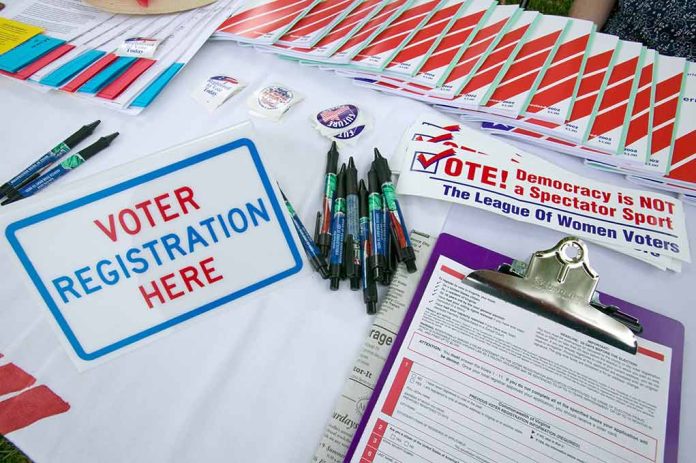
Governor Chris Sununu’s signing of a new voter identification and proof-of-citizenship law leaves New Hampshirites wondering about its implications and timing.
At a Glance
- Gov. Chris Sununu enacted the new voter identification and proof-of-citizenship law.
- The law requires voters to present proof of citizenship when registering and a photo ID at the polls.
- Critics argue the law could disenfranchise voters without proper documentation.
- The law takes effect November 11, just after the upcoming election.
- This comes as New Hampshire faces a closely contested political environment.
Details on the New Law
Gov. Chris Sununu signed House Bill 1569 into law, which mandates presenting proof of citizenship for voter registration in New Hampshire. Acceptable documents for proving citizenship include a birth certificate, passport, or naturalization papers. This move eliminates the affidavit ballot system, and first-time registrants will need to show proof of citizenship and residency.
Despite concerns, Sununu reassured that the legislation would not affect the upcoming general election in November. “We have a proud tradition and proven track record of conducting elections that are trusted and true. Looking forward to the next decade or two, this legislation will instill even more integrity and trust in the voting process.” His statement underscores that the legislation aims to safeguard current and future elections.
New Hampshire's Governor signed a new voter ID law requiring proof of citizenship to vote. This will take effect AFTER the November election, but the change may still confuse thousands ahead of it.
Our own @laurenkun discusses with @AP:https://t.co/oYmoAVB8DW
— VoteRiders (@VoteRiders) September 13, 2024
Arguments For and Against
The bill, introduced by state Rep. Robert Lynn, faced considerable debate. Lynn supports the law as reasonable measures to protect elections. “It’s not unreasonable to require people to be responsible and to do the things that they’re supposed to do in order to be qualified to vote,” Lynn posits. Critics, however, worry about disenfranchisement; voting rights activists argue the bill will unfairly burden some voters and election officials alike.
“This extreme legislation signed by the governor will roll back voting access for all eligible Granite Staters,” said McKenzie Taylor of the New Hampshire Campaign for Voting Rights. The law will require documentation proving age, identity, citizenship, and domicile to register, a change that some believe will complicate the voting process unnecessarily.
Overshadowing the merit of the law itself, critics voice concerns about practicality and timing. The law bypasses the upcoming election but takes effect from November 11. Concerns regarding confusion among voters and election officials mount as they prepare for these new requirements.
Future Implications
Sununu’s administration hopes for strengthened trust in local elections, yet resistance remains. The law’s tough stance makes New Hampshire one of the strictest states regarding voter registration. Critics, like Gilles Bissonnette from the ACLU, argue it burdens marginalized groups. The upcoming election cycle will see if Sununu’s gamble on voter integrity pays dividends or incurs unintended voter deterrence.
“While this law would not be in effect for the upcoming election, any change in law this close to a major election risks confusing all voters,” said Lauren Kunis of Vote Riders, criticizing the bill’s underlying intent.
The forthcoming implementation will be closely watched, both in its impact and efficacy, setting important precedents for voter ID laws across the United States.













